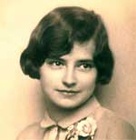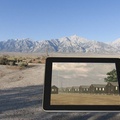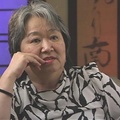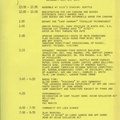3. 1945
Cancelled Inter-Staff Matches — Early Spring
In early spring, Manzanar experiences constant dust storms and light snow, but the boys' basketball team was full of excitement as they prepared for a friendly match against Bishop High School in a nearby town. It was the first time the team would be playing against an opposing school, so the team was very motivated. After getting permission from the Western Defense Command, the Bishop School Board suddenly canceled the match just a few hours before the team was due to depart. They were worried that the arrival of Japanese people in town would cause backlash from the community. Please take a look at the letter attached to the report on the matter left by the Office of Relocation, which stated that the decision was made "to highlight the difference in thinking between the young generation and their narrow-minded parent generation."
January 23, 1945 Manzanar High School, Manzanar, California, Student Council
Dear Students,
I was relieved to receive a letter from Manzanar High School Principal Lorin Fox saying that he understood the situation.
When we were informed that our game against the Manzanar High School basketball team had been suddenly canceled, we gathered signatures from all students and submitted a petition to the school board to overturn the decision. In school, we had learned that democracy and the U.S. Constitution guarantee equal treatment to all Americans. However, some members of the school board were unwilling to acknowledge our petition.
I truly hope that one day I will be able to play against the Manzanar High School team.
Sincerely,
Mickey Duffy Bishop High School, Student Council President 1
Death of President Roosevelt — Spring
"You see, in this situation, it's kids like you who suffer the most. You have to spend your formative years in a place like a camp in the desert. It doesn't affect Yoshiro and me much because we've already developed our personalities. But you have a lot to lose," his older brother Goro said as they walked around the camp on leave after completing basic military training. Gene, now 12 years old, would sometimes remember these words and think about them. At that time, Gene liked the passage about "a new nation conceived in liberty, and determined to realize its proposition that all men are created equal," and had memorized Lincoln's Gettysburg Declaration. At the Poston camp where he and his parents were moved, he witnessed the death of President Roosevelt on April 12.
…Mr. Evans asked me to recite the Gettysburg Declaration at the memorial service. I agreed, but as the time for the service drew near, I began to feel uneasy. What Lincoln said during the Civil War had no relation to President Roosevelt's death. I went to Mr. Evans and explained that I did not want to recite the Gettysburg Declaration, and that I did not think it was appropriate for President Roosevelt's memorial service. Mr. Evans argued and tried to reason with me, but my mind remained the same. …He was the one who put us in the camps. I felt no sadness or emotion for his death. 2
End of the War - Midsummer
On his 16th birthday, Henry left the internment camp by himself and returned to Seattle. He wanted to have a place to live and other things ready before his parents returned from the camp. Henry started working as a lawn mower, hoping to save money to ease the pain of rebuilding his life for his elderly parents. He was mowing the lawn when Germany surrendered, and was informed by the family that "Germany has surrendered. The war is over in Europe." He was also mowing the backyard of another house when the atomic bomb was dropped on Hiroshima. While he was laboriously mowing the sloping backyard of the wealthy John Nordstrom family, Mrs. Nordstrom, who was always kind to him, appeared in the yard with a big smile and a glass pitcher of lemonade in her hand, and said, "Henry, your worries are over now." Henry learned of the surrender of Japan from Mrs. Nordstrom. 3
45 miles south of Seattle, where Henry was, Shoji Suko was serving time at McNeil Island Federal Prison for draft refusal4 , and he also mowed the lawn. "On August 14, 1945, I was pushing the lawnmower at the prison warden's house. I heard the Emperor's Imperial Rescript on the Termination of the War transmitted over the shortwave radio from the warden's window. I pushed the lawnmower with such fervor that I didn't even bother to wipe away the tears that were streaming," he wrote in a memo to Ito Kazuo.5
Meanwhile, Ayako, who was still at Tule Lake, watched from her window as a group of young second-generation Japanese immigrants huddled around a barrack a few doors down, crying as they listened to the news of Japan's surrender on a hidden shortwave radio. Ayako's family had planned to return to Japan after the war, but her father made the bold decision for them to stay in America. "Japan has been at war for a long time, and everyone is having a hard time. Now is not the time to go back to Japan. If you go back now, you will only be a burden on your family and relatives. It would be better for you to stay in America, get a job, and send some money home." 6
Mr. and Mrs. Itaya — Autumn
Billy's grandmother Rio had been recuperating since November of the previous year, and even by the end of September she was still irritable, sensitive to noise, and plagued by headaches, loss of appetite, and shallow sleep. The doctor diagnosed her as neurotic. Mary and Billy, the last remaining family members, left in July to join Bill, who had started work in Cleveland. With the number of family members dwindling one by one, Junzo and Rio were left alone in the camp, and felt truly lonely. The small amount of money they had brought with them when they were evicted had long ago disappeared. Their last hope was the rhubarb farm in California that they had been asked to manage. 7
Time to say goodbye — late autumn
Three and a half years ago, Ayako's mother was preparing to move out, and she said to her, "Aya, pick one toy that you like to take with you," so she ran to where three bookshelves were lined with neatly arranged books and toys. Ayako writes about that time as follows:
Her favorite books were Mother Goose Rhymes with beautiful illustrations, a big Grimm's Fairy Tales picture book, and an old poetry book with a faded blue cover that had been given to her by her next door neighbor, Lennie. Lennie was eight years older than her, but they were both only children, so they grew up like sisters. There were dolls still in their boxes, coloring books, crayons, games, and a chalkboard easel where she had spent hours drawing enthusiastically...and then her eye fell on Patsy, a cute baby doll Lennie had given her the previous Christmas. She had big blue eyes, a pretty nose and mouth, dimples on her cheeks, and short blonde hair that curled under a pink hat. She wore a white, sheer dress with little pink polka dots that tied at the back, and a matching pink coat over it. She was ready to go out, with white socks with lace trim at the cuffs and white Mary Jane shoes. When I picked up Patsy and held her in my arms, I knew she was the one who was going to go camping with me .
Patsy accompanied Ayako wherever she went, from Puyallup to Minidoka to Tule Lake. Among the friends she made here at Tule Lake were Yumi and Sachi. One day, without warning, Yumi and Sachi's father was taken to a detention center in Bismarck, North Dakota, managed by the Department of Justice. Yumi's family said a sad farewell to him, saying, "Dad, we'll see you in Japan." In November, Ayako's family decided to leave the camp and return to Seattle, and her mother and Sachi came to see her off at the barbed wire fence, carrying Yumi.
It was a very sad and tearful farewell, as we all thought in our hearts that we would never see each other again. I felt sorry for Yumi and the others, who had to leave their father behind and return to Japan. As the gates were closing behind me, I quickly handed Patsy to Yumi . Yumi took Patsy slowly, cradled her in her arms, and snuggled up to her, just as I had done so many times before.
I don't want to go out - late autumn
In these three and a half years, the Japanese cultivated the barren land, grew vegetables, planted flowers around the bleak barracks, created Japanese gardens, made crafts with what they had, built libraries, devised simple air conditioners to ease the heat, built ice skating rinks, wrote songs, and achieved "to squeeze as much normality as possible out of this abnormal situation." However, now that the fourth autumn has arrived, all that remains in the camp are the elderly and children of the Issei. After working tirelessly for 30 or 40 years, some Issei who had lost their homes, jobs, and everything else in the internment camps preferred to remain in the camps, where at the very least food, clothing, and shelter were guaranteed, rather than return to a society where anti-Japanese sentiment still lingers.
In 1942, they were forced into concentration camps with all the belongings they could carry, but this time they were given $25 each and a one-way ticket and forced out into the outside world. By the end of November 1945, all the concentration camps except Tule Lake were closed. On March 20, 1946, the Tule Lake Segregation Center was closed.
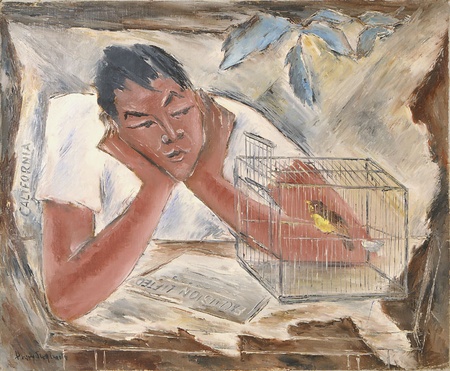
Notes:
1. Lindquist, Heather C. (Ed.). Children of Manzanar. Independence: Manzanar History Association, 2012
2. See above, "Torn Identity: The Life of a Japanese-American Journalist"
3. Henry Miyatake, interview by Tom Ikeda, May 4, 1998, Densho Visual History Collection, Densho.
4. Between January and August 1944, more than 2,000 Nisei of draft age received the draft notice. However, 358 young men, including the members of the Fair Play Committee in Heart Mountain who refused the draft, saying that they could not serve until they had regained their rights as citizens and sent their families home, Jim Akutsu of Minidoka who refused the draft, saying that he would follow the government's decision, because the government's 4-C (enemy alien) status for Nisei Japanese Americans clearly stated that they were not obligated to serve in the military, and Gordon Hirabayashi who followed his own beliefs as a conscientious anti-war activist, each considered how to behave in the given environment and courageously refused the draft. Many of them were tried, convicted, and imprisoned in federal prisons.
5. See above, "Eighty Years of American Spring and Autumn."
6. Peggy Ayako Nagata Tanemura, interview by Yuri Brockett and Jenny Hones, November 21, 2013 at Seattle, WA.
7. See Colors of Confinement: Rare Kodachrome Photographs of Japanese American Incarceration in World War II .
8. Tanemura, Peggy Ayako Nagata. “Patsy” from Omoide IV: Childhood Memories . Seattle: Nikkei Heritage Association of Washington, 2005.
9. “Patsy” from Omoide IV: Childhood Memories
*Reprinted from the 136th issue (February 2014) of the quarterly magazine "Children and Books" published by the Children's Library Association.
© 2014 Yuri Brockett


